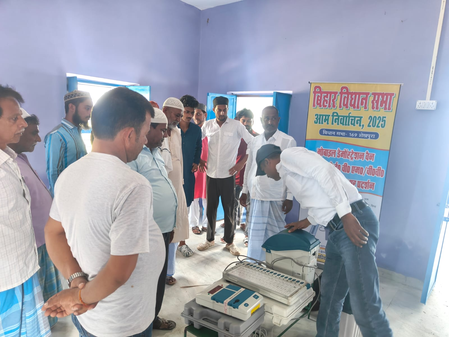
New Delhi, Aug 31 (IANS) The Election Commission of India (ECI) has issued a strong rebuttal to allegations made in a recent media report claiming large-scale duplication in Bihar’s ongoing Special Intensive Revision (SIR) of electoral rolls.
In a detailed statement on Sunday, the Chief Electoral Officer (CEO) of Bihar clarified that the draft rolls published under the SIR 2025 are provisional in nature and explicitly meant for public scrutiny.
“Any alleged duplication at this stage cannot be construed as a final error,” the statement by CEO Bihar said on X, stressing that the law provides for objections, verification, and correction before final publication.
Addressing the figure of 67,826 “dubious duplicates” cited in the report, the CEO argued that it “is based on data-mining and subjective matching of name/relative/age combinations”, adding that, “These parameters, without documentary and field verification, cannot conclusively prove duplication.”
In rural Bihar, it is common for multiple individuals to share identical names and ages, making such digital extrapolations unreliable, the post explained.
The ECI highlighted that its ERONET 2.0 system flags probable duplicates as Demographically Similar Entries (DSEs), which are only removed after field verification by Booth Level Officers (BLOs) and Electoral Registration Officers (EROs).
Citing examples from Valmikinagar, officials said mere numerical claims cannot establish factual duplication without detailed reports, the poll panel said.
Individual cases like “Anjali Kumari” of Triveniganj and “Ankit Kumar” of Laukaha were described as clerical or migration-related errors, both of which have already been corrected through Form 8 submissions.
The rebuttal also dismissed claims that making rolls “non-scrapable” hindered transparency, calling it a safeguard under Rule 22 of the Registration of Electors Rules, 1960, in line with Supreme Court directions in Kamalnath vs ECI (2018).
Reiterating statutory safeguards, the CEO underlined that Section 22 of the Representation of the People Act, 1950, empowers EROs to delete duplicates.
“The draft roll is subject to continuous scrutiny, objections, and statutory corrections until the final list is published,” it said, adding that “the report’s conclusions that the SIR ‘facilitates fraud’ or that duplicates will decisively impact elections are speculative, premature, and contrary to the legal framework governing electoral roll management.”
–IANS
sas/uk



